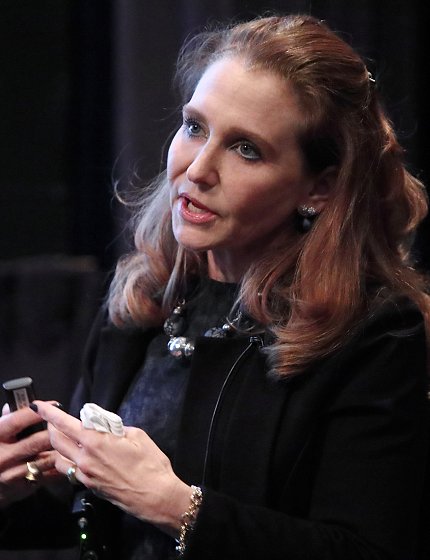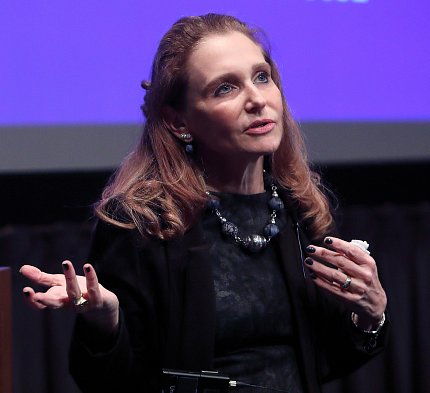Needless Suffering
Access to Palliative Care, Pain Relief Out of Reach for World’s Poor

Photo: Chia-Chi Charlie Chang
The world’s poorest citizens have almost no access to the palliative care and pain relief that provide respite from serious health-related suffering, said Dr. Felicia Knaul at a recent Center for Cancer Research Grand Rounds in Lipsett Amphitheater. Palliative care is one of the most neglected areas in global health today, she said.
“The poorest 50 percent of people that inhabit our world have access to 1 percent of distributed opioid morphine equivalent. The wealthiest 10 percent have access to 90 percent,” explained Knaul, a professor in the University of Miami’s department of public health sciences at the Leonard M. Miller School of Medicine and director of the University of Miami Institute for Advanced Study of the Americas.
From 2014-2017, she served as chair of the Lancet Commission on Global Access to Palliative Care and Pain Relief. The commission found that, in 2015, more than 61 million people worldwide experienced serious health-related suffering, including 5.3 million children. These individuals experienced physical and psychological symptoms, including pain, for at least 6 billion days of suffering and up to 21 billion days of suffering.
Cancer is one of the biggest causes of suffering—16 million cancer patients worldwide in 2015 experienced serious health-related suffering. In addition, in low-income countries, other causes, such as infectious diseases, HIV and malnutrition, also account for massive suffering, yet are preventable. A large part of the burden of suffering among the poor “happens because of a lack of access to appropriate and necessary health care.”
European countries are considered the “gold standard” or benchmark for access to pain relief medications—a core component of palliative care, Knaul said. By contrast, opioid medications are largely unavailable in low- and middle-income countries, which cover much of Asia, Africa and Latin America and the Caribbean, and notably include countries with large populations such as India and Russia. The U.S., Canada and Australia have especially large amounts of these medications compared to patient need.
To prevent an opioid crisis similar to the one in the United States, she suggests countries regulate the supply and marketing of opioids for medical use, especially by avoiding direct marketing to health care providers. Knaul also recommends that health practitioners receive mandatory training for the safe management of opioid prescriptions and that these prescriptions follow evidence-based practice.
An essential package for palliative care services was developed by the commission to address the global burden of serious health-related suffering. It includes low-cost pain relief medicines such as off-patent morphine as well as equipment and health professionals who can administer care at the primary level. Knaul thinks “any country at any level of income” should be able to provide the most basic palliative care services by 2030.

Photo: Chia-Chi Charlie Chang
Closing the pain divide—the disparities in access to pain relief, which serve as a marker for tracing inequities in palliative care—is relatively inexpensive compared to many other global health priorities and health needs, she said. Providing morphine to children who experience pain associated with serious health-related problems in low-income countries, for example, would cost only $1,034,000 per year. That price, however, covers only the medication and doesn’t include the cost of getting the medications to the patients.
Beyond the medicines, it will take political will to close the global divides in access to pain relief and palliative care. In Mexico, for example, Knaul said a group of non-governmental organizations led by the Mexican Health Foundation and Tómatelo a Pecho, AC worked with one of the country’s Supreme Court justices, the minister of health, leading clinicians from a number of hospitals including the Mexican National Cancer Institute and Human Rights Watch to advocate for palliative care. That advocacy drove explicit policy changes including financial protection of the entitlement to palliative care and a switch from paper to electronic prescribing for opioid medications.
In many parts of the world, palliative care isn’t a priority. Knaul thinks this is because we lack metrics and indicators measuring illness-related suffering.
“We saw that, shockingly, palliative care and pain relief was just being ignored, it was cast aside,” she noted. “Most health ministers don’t even realize that the issue is there.”
The commission is beginning to develop a comprehensive metric to quantify suffering, building on the concept of serious health-related suffering “to measure how much patients value the alleviation of suffering independent of whether or not it makes them live longer.”
If they are successful, Knaul believes that ending serious illness-related suffering could become a priority for countries around the world. Such a metric would provide an opportunity to track the performance of countries that provide palliative care and pain relief.
“We’re actually just starting to scratch the surface of understanding about suffering-intensity-adjusted life years and how patients and families value the alleviation of pain and other symptoms,” Knaul said.
